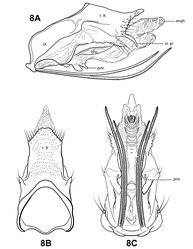Itauara brasiliana
| Notice: | This page is derived from the original publication listed below, whose author(s) should always be credited. Further contributors may edit and improve the content of this page and, consequently, need to be credited as well (see page history). Any assessment of factual correctness requires a careful review of the original article as well as of subsequent contributions.
If you are uncertain whether your planned contribution is correct or not, we suggest that you use the associated discussion page instead of editing the page directly. This page should be cited as follows (rationale):
Citation formats to copy and paste
BibTeX: @article{Robertson2011ZooKeys114, RIS/ Endnote: TY - JOUR Wikipedia/ Citizendium: <ref name="Robertson2011ZooKeys114">{{Citation See also the citation download page at the journal. |
Ordo: Trichoptera
Familia: Glossosomatidae
Genus: Itauara
Name
Itauara brasiliana (Mosely 1939) – Wikispecies link – ZooBank link – brasiliana Pensoft Profile
- brasiliana (Mosely), 1939: 220 [Type locality: Brazil, Santa Catarina, Nova Teutonia; BMNH] in Antoptila]. –Angrisano, 1993: 59 [larva, pupa, case, distribution] 1997:58 [distribution] – Flint, Holzenthal, and Harris, 1999:74 [to Itauara].
Description
This species is easily diagnosed by the presence of 2 pairs of extremely elongate, seta-like processes on sternum IX. Itauara brasiliana is also distinct in having vestigial parameres, consisting only of very small, setose lobes. Another distinguishing characteristic is the shape of segment IX, which is rather narrow, and receded ventrally. The rather elongate profile of tergum X, as well as the shape of the dorsomesal and lateral margins of tergum X, slightly resembles that of Itaura plaumanni (Flint 1974[1]). However, Itaura plaumanni has much more pronounced, elongate parameres, and lacks the seta-like processes on sternum IX.
Adult. Body, wings, and appendages pale or tawny brown in alcohol. Forewing slightly broader past anastomosis, but with margins nearly parallel, apex rounded. Forewing venation incomplete, with apical forks I, II, and III present; Sc and R1 distinct along their entire lengths; fork I sessile; fork II petiolate, stem shorter than fork; fork III petiolate, stem about the same length as fork; Cu1 complete, reaching wing margin; Cu1 and Cu2 intersecting near anastomosis; row of erect setae present along Cu2; A3 absent; crossveins forming a relatively linear transverse cord; discoidal cell longer than Rs vein. Hind wing margins nearly parallel, tapering only slightly past anastomosis; apical forks II and V present; Sc and R1 converging near wing margin; A2 absent. Tibial spurs 1,4,4, foretibial spur extremely reduced and hairlike. Sixth sternal process thumb-like, apex rounded, associated with oblique apodeme posteriorly.
Male genitalia. Preanal and inferior appendages absent. Segment IX ventrally narrow, broad medially; anterior margin relatively straight from dorsum to medial area, ventral portion rounded; posterolateral margin highly membranous, receding ventrally; sternum IX bearing 2 pairs of extremely elongate, seta-like processes. Tergum X incompletely fused to tergum IX with membrane or lightly sclerotized region ventrolaterally; dorsomesal margin subtriangular, slightly upturned; dorsolateral margin slightly irregular, without processes; ventrolateral margin with 2 pairs of processes, the upper an elongate finger-like process slightly downturned, the lower a smaller lobe-like setose process. Parameres vestigial, consisting of a pair of small, digitate setose lobes arising ventrolaterally from endotheca. Phallobase apparently absent or entirely membranous. Phallicata forming a long, lightly sclerotized dorsal sheath, sinuous, broadest medially, narrowed distally. Endophallus membranous, enlarged and convoluted when invaginated.
Material examined
Holotype male: Brazil: Santa Catarina: Nova Teutonia, ii. 1937 (F. Plaumann) (BMNH)
Additional material examined:
ARGENTINA: Misiones: Arroyo Piray Mini, W., Dos Hermanas, 23.11.1973 (O.S. Flint) — 5 males, 14 females (NMNH); BRAZIL: Santa Catarina: Seara (Nova Teutônia), 27°11'00"S, 052°23'00"W, 300–500 m, 10.1964 (F. Plaumann) — 1 male (NMNH).
Taxon Treatment
- Robertson, D; Holzenthal, R; 2011: Revision of the Neotropical caddisfly genus Itauara Müller, 1888 (Trichoptera, Glossosomatidae) ZooKeys, 114: 41-100. doi
Other References
- ↑ Flint O, Jr. (1974) Studies of Neotropical caddisflies, XVIII: new species of Rhyacophilidae and Glossosomatidae (Trichoptera). Smithsonian Contributions to Zoology 169:1-30.
Images
|


